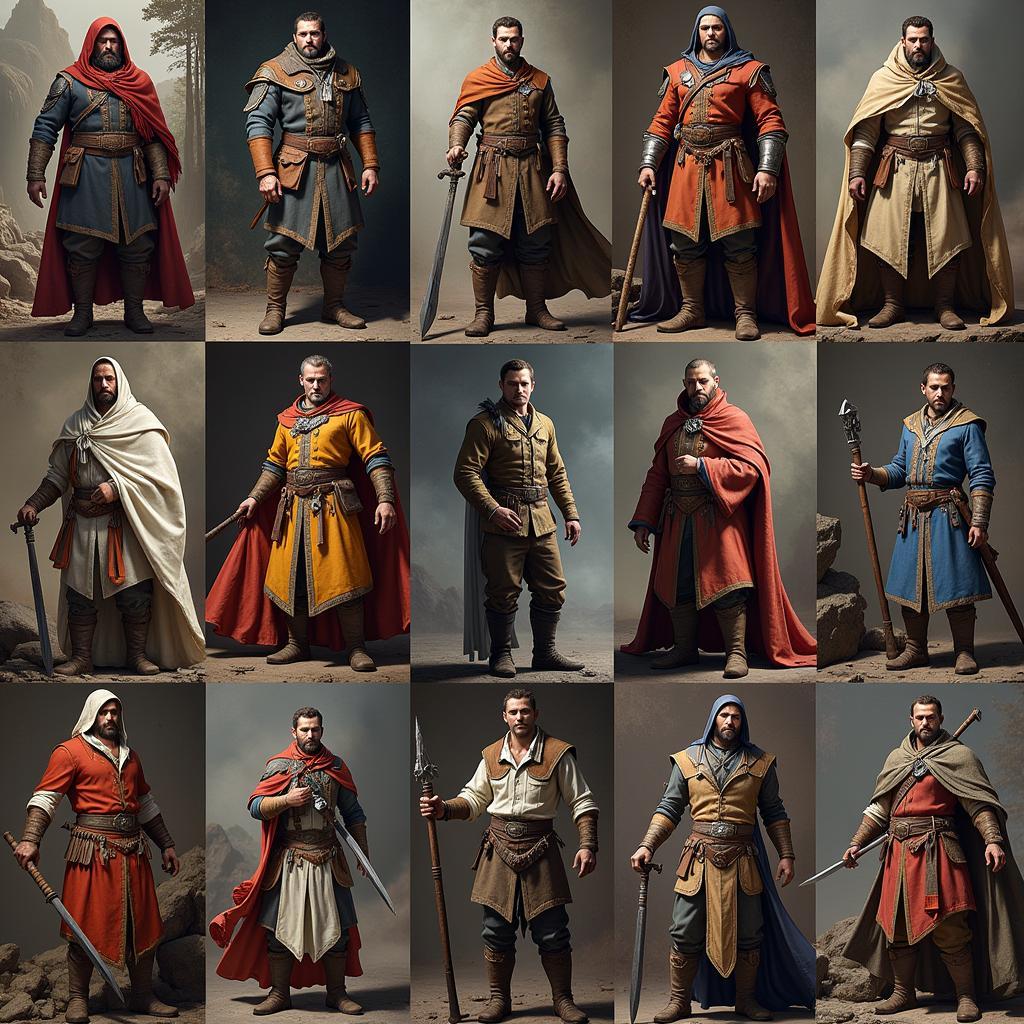Understanding NPC Jobs: A Deep Dive into Their Roles and Significance
October 21, 2024Non-player characters, or NPCs as they are more commonly known, are an essential part of any successful video game. They provide depth, context, and interaction, transforming a static environment into a living, breathing world. But have you ever stopped to consider the sheer variety and complexity of Npc Jobs? Let’s delve into the roles they play and why they are so crucial to the gaming experience.
 Various Roles of NPCs in Video Games
Various Roles of NPCs in Video Games
More Than Just Background Noise: The Importance of NPC Jobs
From the humble shopkeeper to the formidable quest giver, NPCs breathe life into the digital realm. They aren’t simply there to populate the world; they serve specific purposes, guiding players, providing challenges, and enhancing immersion. Imagine stepping into a bustling city in your favorite RPG, only to find it devoid of its inhabitants. The silence would be deafening, the experience hollow.
NPC jobs contribute to a game’s:
- Realism and Immersion: A world teeming with characters engaged in diverse activities feels believable and dynamic.
- Storytelling: NPCs drive narratives forward, offering quests, revealing information, and shaping the player’s journey.
- Gameplay Mechanics: They provide essential services, trade opportunities, and opportunities for skill development.
 NPC Interaction Enhancing Gameplay in an RPG
NPC Interaction Enhancing Gameplay in an RPG
A Diverse Workforce: Exploring Common NPC Jobs
The world of NPCs is incredibly diverse, mirroring the complexities of our own societies. Here are some of the most common NPC jobs you’ll encounter:
1. Merchants and Vendors:
These entrepreneurial NPCs keep players well-stocked and ready for adventure. From blacksmiths forging powerful weapons to apothecaries peddling potent potions, these vital characters fuel a player’s progress.
2. Quest Givers:
No hero’s journey is complete without a quest, and that’s where these NPCs come in. They provide purpose and direction, sending players on epic adventures to vanquish foes, retrieve lost artifacts, or uncover ancient secrets.
3. Guards and Soldiers:
Tasked with maintaining order (or enforcing tyranny), guards are a staple of many games. They might stand as obstacles, offer protection, or become formidable adversaries depending on their allegiance.
4. Skilled Professionals:
From master craftsmen who can enhance your gear to knowledgeable trainers who can teach you new skills, these NPCs offer valuable services that enhance your character’s abilities.
5. Informants and Storytellers:
These NPCs are keepers of knowledge, possessing vital information that can aid your quest or deepen your understanding of the game’s lore.
6. Random Encounters:
Not all NPCs have defined roles. Some wander the world, adding to the sense of a living, breathing environment. They might offer a fleeting conversation, a moment of humor, or even an unexpected challenge.
Behind the Scenes: The Mechanics of NPC Jobs
The seamless integration of NPC jobs within a game world is a testament to the efforts of game developers and designers. Through a combination of artificial intelligence (AI), scripting, and careful design, NPCs are brought to life, each with their own routines, motivations, and interactions.
For instance:
- Pathfinding: NPCs need to navigate their environments realistically, whether patrolling a set route or reacting dynamically to player actions.
- Dialogue Trees: Conversations with NPCs often involve branching dialogues, allowing players to make choices that influence the course of the interaction.
- Faction Systems: Many games incorporate faction systems that govern NPC allegiances, affecting how they interact with the player and each other.
The Future of NPC Jobs: Evolving Roles and Player Interaction
As technology advances, the roles of NPCs are becoming increasingly complex and dynamic. We can expect to see:
- More Realistic AI: NPCs with enhanced decision-making abilities, leading to more immersive and unpredictable interactions.
- Procedural Generation: The use of algorithms to create unique NPCs and quests, ensuring a constantly evolving gaming experience.
- Player Choice and Consequence: NPCs whose fates are directly impacted by player decisions, leading to a greater sense of agency and consequence.
The evolution of NPC jobs is a testament to the ever-expanding possibilities of video games. From simple shopkeepers to complex characters with intricate backstories, they are integral to creating engaging and immersive worlds that captivate players. So, the next time you encounter an NPC, take a moment to appreciate the role they play in shaping your virtual adventures.
FAQ about NPC Jobs
1. Can NPCs level up like players can?
While some games allow for certain NPCs to grow stronger alongside the player, in most cases, NPCs have fixed levels and abilities.
2. Are all NPCs friendly?
Not at all! NPCs can be friendly, neutral, or hostile, depending on their role in the game world. Be prepared to encounter enemies and allies alike.
3. Can I marry an NPC?
Some games, particularly RPGs, feature romance options and even the ability to marry certain NPCs.
4. Do NPCs respawn if they are killed?
Respawn mechanics vary from game to game. Some NPCs may respawn after a certain amount of time, while others may be gone for good.
5. Can I create my own NPC?
While most games don’t allow for full NPC creation, some offer customization options or modding tools that enable players to tweak appearances and behaviors.
We hope this article has provided valuable insights into the fascinating world of NPC jobs. For further information, explore our other articles on video game development and design.
Need Assistance? Contact Us!
Phone Number: 0915117117
Email: [email protected]
Address: To 3 Kp Binh An, Phu Thuong, Viet Nam, Binh Phuoc 830000, Viet Nam.
Our customer support team is available 24/7 to assist you.